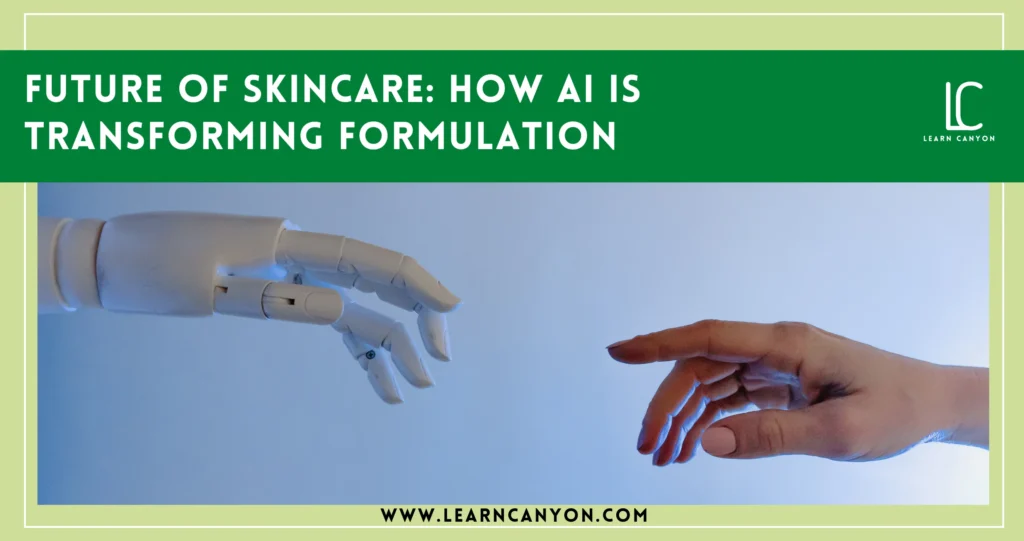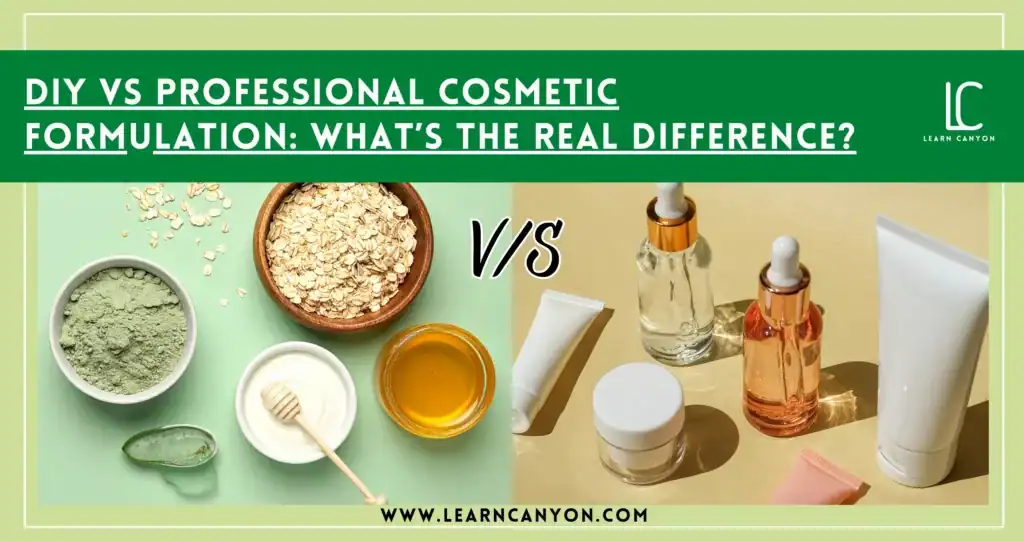Are you tired of the conventional skincare formulation and its system?
What do you think should change when it comes to future skincare transformation?
Well, you might not be aware of the current research that makes future skincare formulation and its approach more simpler and personalized to meet your beauty needs.
AI is the solution to your beauty problems. But how can AI change this revolution, you might ask?
The answer is the future of skincare is deliberately being shaped by the integration of artificial intelligence (AI) in the formulation process. AI technology is revolutionising how skincare products are developed, allowing for more personalized and effective solutions. By analyzing vast amounts of data and identifying patterns, AI is enabling the creation of tailored skincare formulations that cater to individual needs and preferences.
With the help of AI, skincare companies can harness the power of predictive analytics to anticipate consumer demands and develop products that address specific concerns. By leveraging machine learning algorithms, AI can process diverse sets of information, such as skin types, environmental factors, and ingredient efficacy, to optimize the effectiveness of skincare formulations. This innovative approach not only streamlines the product development process but also ensures that the result is better aligned with the evolving needs of consumers.
As the skincare industry continues to embrace AI-driven formulation, the potential for groundbreaking advancements in product innovation and customization is becoming increasingly evident. By embracing this transformative technology, skincare brands are poised to deliver solutions that are not only more targeted and efficient but also resonate more deeply with the diverse and evolving needs of consumers.
Let’s understand this more deeply!
Current Landscape: AI In Skincare
Conventional SKINCARE FORMULATIONS have long taken a one-size-fits-all approach, frequently failing to address the various and specialised needs of different skin types. Whether it’s sensitive, oily, normal, or dry skin, the beauty industry has struggled to find the ideal ingredient mix for maximum results.
However, with the introduction of AI, the landscape is set to undergo a significant transformation.
While the use of AI in numerous industries has grown steadily, its interaction with the skincare industry is especially striking.
According to PwC’s Global Artificial Intelligence Study, AI has the potential to contribute an additional $15.7 trillion to global GDP by 2030. A major portion of this is likely to arise from the retail sector & cosmetics industry.
Today’s buyers, especially Generation Z and millennials, are technologically sophisticated and expect more immersive and personalised experiences. Recognising this, beauty businesses have rushed to include AI in their plans.
The stats also present a positive picture: a study found that the worldwide AI in the cosmetics industry market was worth $2.68 billion in 2022. And it’s expected to expand at a 14.4% compound annual growth rate (CAGR) between 2022 and 2027.
In summary, the contemporary landscape is more than just AI in skincare; it is about a sector being transformed by customer needs, technological prowess, and a thirst for reinvention. The seamless integration of AI and beauty is unquestionably more than a fad; it is an evolutionary process that promises to make the cosmetics experience richer, more personalised, and highly engaging.
Understanding The Role Of AI In Skincare Formulation
Let’s first understand the definition of Artificial Intelligence or AI;
It is defined broadly as intelligence demonstrated by machines, particularly computer systems. It is a branch of computer science study that creates and researches methods and software that allow machines to observe their surroundings and use learning and intelligence to conduct actions that maximise their chances of reaching set goals. Such devices are referred to as AIs.
Now, How AI is applied In the Skincare Industry?
AI has been increasingly applied in the skincare industry in various ways:
- Personalized Skincare Recommendations:
AI algorithms analyze data from consumers, including skin type, concerns, and environmental factors, to provide personalized skincare recommendations. These recommendations can include specific products, routines, and even lifestyle adjustments tailored to individual needs.
- Virtual Try-On and Visualization:
Virtual try-on tools powered by AI allow users to visualize how skincare products will look on their skin before making a purchase. These tools utilize augmented reality (AR) technology to overlay virtual or AI skincare products onto real-time images or videos of the user’s face.
- Skin Analysis and Diagnosis:
AI-powered skin analysis tools analyze images of the skin to detect various conditions such as wrinkles, acne, dark spots, and pores. These tools can provide insights into skin health and help users track changes over time.
- Formulation Optimization:
AI algorithms can assist in optimizing skincare formulations by analyzing ingredients and their effectiveness for different skin types and concerns. This can lead to the development of more effective and targeted skincare products.
- Customer Service and Support:
AI-powered chatbots and virtual assistants can provide customer service and support to skincare consumers. These virtual assistants can answer questions about skincare products, provide recommendations, and offer skincare advice based on individual needs.
- Research and Development:
AI is also used in skincare research and development to discover new ingredients, formulations, and technologies. Machine learning algorithms can analyze vast amounts of data to identify trends, predict consumer preferences, and accelerate the development of innovative skincare solutions.

Explanation Of AI Skincare Analysis (retrieving SKIN data)
Artificial intelligence analyzes skin data through a combination of techniques, including image processing, machine learning, and deep learning algorithms.
Here’s how the process typically works:
- Data Acquisition:
AI skincare analysis systems undergo skin data acquisition where skin data can be acquired through various sources, including images captured by cameras, smartphones, or specialized devices such as dermato-scopes. Other data sources may include textual descriptions of skin conditions or parameters measured by sensors, such as moisture levels or elasticity.
- Preprocessing:
Before analysis, the skin data may undergo preprocessing to enhance quality and remove noise. This can involve tasks such as image normalization, noise reduction, and feature extraction. For textual data, preprocessing may include text cleaning and feature engineering.
- Feature Extraction:
In image-based analysis, features such as texture, colour, shape, and intensity are extracted from the skin images. These features serve as input to machine learning algorithms. In textual analysis, features may include keywords, sentiment scores, or semantic representations of the text.
- Model Training:
Machine learning algorithms, including traditional classifiers, decision trees, support vector machines, or more advanced techniques like convolutional neural networks (CNNs) for image data or recurrent neural networks (RNNs) for sequential data, are trained on labelled skin data. Labelled data typically consists of images or text annotated with ground truth labels indicating skin conditions or characteristics.
- Model Evaluation and Validation:
The trained AI model is evaluated using validation data to assess its performance in accurately classifying or predicting skin conditions. Metrics such as accuracy, precision, recall, and F1-score are commonly used to evaluate model performance.
- Deployment and Application:
Once validated, the AI model can be deployed for various applications in the skincare industry, such as skin condition diagnosis, personalized product recommendations, virtual try-ons, or real-time skin analysis in beauty apps or devices.
Throughout this process, AI algorithms learn patterns and relationships from the SKIN DATA, allowing them to make accurate predictions or classifications of skin conditions and provide valuable insights for skincare professionals and consumers alike.
Role of AI in Cosmetic Formulations
The basic role of AI in cosmetic formulation:
- AI has the potential to revolutionise skincare products by enabling unprecedented accuracy and customised cosmetic FORMULATIONS. The future of cosmetic industry entails AI algorithms for assessing large datasets such as individual skin profiles, ambient conditions, and chemical combinations. This data-driven method strives to develop skincare formulations that are specifically tailored to each user, with different skin problems.
- AI allows for PERSONALIZED FORMULATIONS that take into account each individual’s unique skin profile, rather than general skin type classifications. AI algorithms adapt cosmetic formulations to treat specific concerns, taking into account genetics, lifestyle, and climate, resulting in a genuinely personalised skincare experience.
- AI-POWERED FORMULATIONS could evolve in real-time, making dynamic modifications to meet the changing needs of the skin. This adaptability ensures that the skincare programme is effective and relevant in the long run.
These days the professional formulation team of any big cosmetic company uses AI to optimise component combinations for best performance across diverse skin types. This expertise in ingredient selection produces formulas that not only address individual symptoms but also enhance general skin health.
Due to the rapid spread of AI in skincare, all the high-tech cosmetic firm has virtual formulation tools to develop formulations with the click of a button, allowing customers to innovate more quickly and efficiently. These solutions are intended to optimise multiple product qualities at once, automating up to 80% of the formulation cycle. Customers can swiftly reformulate old products or locate ingredient alternatives to meet new needs. Furthermore, AI-based insights enable clients to move beyond the constraints of human heuristics and push beyond the limits of formulation innovation.
These big corporations use deep learning frameworks, similar to those used in de novo drug development, to create the world’s most advanced AI formulation. Their patent-pending approach represents the first industrial application of general adversarial networks (GANs) and recurrent neural networks (RNNs) at the formulation level. Deep neural networks are the first category of algorithms in which more data results in improved performance due to their scalable nature. Furthermore, deep learning eliminates the requirement for human-driven feature extraction.
NOTE: Rapid Innovation Cycles: Traditional skincare formulation methods can be time-consuming and labour-intensive. The one-on-one methodology of traditional formulation also makes you re-calculate and re-fix cosmetic ingredients in a formulation that needs constant evaluation as it might not match the customer’s needs or have a proper efficacy level.
That is why, with AI optimizing the process, our Learn Canyon team can innovate faster and bring cutting-edge formulations to market cosmetic items more quickly.

How do AI Algorithms Optimize Skincare Formulas, Ingredient Selection, Concentration & Compatibility?
AI algorithms optimize skincare formulas by employing a combination of data analysis, machine learning, and computational techniques.
Here’s how they tackle ingredient selection, concentration optimization, and compatibility analysis:
- Ingredient Selection:
- Data Gathering: AI algorithms collect a vast array of data on skincare ingredients from various sources, including scientific literature, clinical trials, product formulations, and consumer reviews.
- Feature Extraction: Relevant features of each ingredient are extracted from the data, such as chemical composition, reported skin benefits, potential side effects, and interactions with other ingredients.
- Machine Learning Models: Supervised learning models are trained using labelled data to predict the efficacy and safety of ingredients for specific skincare concerns or skin types. These models learn from existing knowledge and patterns in the data to make informed recommendations for ingredient selection.
- Data-driven Decision Making: AI algorithms analyze the collected data to identify the most effective and suitable ingredients for addressing different skincare needs while considering factors like skin type, sensitivity, and desired outcomes.
- Concentration Optimization:
- Dose-Response Analysis: AI algorithms analyze dose-response relationships for each ingredient, studying how the concentration of an ingredient affects its efficacy and safety. This analysis helps determine the optimal concentration range for achieving desired skincare benefits without causing irritation or adverse reactions.
- Formulation Simulation: Computational models simulate the interactions between ingredients at different concentrations to predict the efficacy and stability of the skincare formula. AI algorithms optimize ingredient concentrations based on these simulations to ensure optimal performance and product stability.
- Compatibility Analysis:
- Chemical Compatibility: AI algorithms assess the chemical compatibility of ingredients to prevent adverse reactions or instability in the final AI skincare products. They analyze the chemical properties of each ingredient and predict potential interactions that could affect product efficacy or safety.
- Formulation Optimization: By considering the chemical compatibility of ingredients, AI algorithms optimize the formulation to ensure that the selected ingredients work synergistically and enhance each other’s effectiveness without compromising stability or safety.
- pH Compatibility: Skincare products often have specific pH requirements for optimal efficacy and compatibility with the skin. AI algorithms analyze the pH levels of ingredients and optimize the formulation to maintain the desired pH range for maximum effectiveness and skin compatibility.
Through these processes, AI algorithms help skincare companies develop optimized formulas that are scientifically backed, personalized to individual needs, and designed to deliver effective results while minimizing the risk of adverse reactions or skin sensitivities.
Benefits of AI Skincare Formulation
- Lowering the cost of quality
Making cosmetic products that fulfil quality standards is a hard and costly process. However, the AI approach comes to the rescue, lowering the cost of high-quality beauty products. It works by recording odors with sensors and then interpreting them using machine learning algorithms. This inhibits product degradation by objectively and consistently assessing the quality of raw materials and finished products.
- Guarantees transparency in ingredients.
Companies can ensure clean and safe goods by introducing AI into their cosmetics supply chains and tracking and monitoring the use of hazardous substances like palm oil. This provides consumers peace of mind about the substances in their beauty and cosmetics.
- Provides personalised recommendations to save consumers time
E-commerce platforms that incorporate artificial intelligence technology can provide more accurate product beauty recommendations while also streamlining search and filtering procedures. This removes the need for heavy manual labour and makes product discovery more efficient and convenient for customers.
- Combining AI With Augmented Reality
AI and augmented reality (AR) have become significant tools in the cosmetics sector. Users of such technologies may virtually try on makeup and various hair tones. This removes the need to constantly eliminate and reapply cosmetics, making the method more comfortable and effective.

Latest AI-Personalized Skin Treatment Plans
- AI-powered skin diagnostic apps
For SKINCARE ROUTINE maintenance, AI-powered skin diagnosis applications provide consumers with a thorough grasp of their skin issues.
These apps analyze aspects such as swollen eyes, dark circles, thinning hair, and other skin health indicators to deliver useful insights.
Users can monitor their progress over time and make informed decisions regarding their skincare routines using timely and precise data.
- Prescribed skin care regimes
The primary objective is to provide consumers with personalized, prescriptive skincare routines that are tailored to their specific skin issues and preferences.
AI-enabled feedback systems enable users to track performance and make modifications to attain their desired radiant appearance and general skin health.
Very well-known organic skincare industries, such as Derma Co., Forest Essentials, Soultree and others have included smart skin analysis on their websites or apps, providing customers with regimes and product recommendations.
How AI-Driven Cosmetic Formulations Support Sustainability and Ethical Considerations
Cosmetic formulators who are new to AI-powered formulations must understand how AI-driven formulation processes minimize the need for trial and error, reducing waste and environmental impact associated with traditional product development as well as ethical ingredient sourcing that facilitates the identification of sustainable and ethically sourced ingredients, promoting transparency and responsible sourcing practices.
Here’s how:
- Reduction of Waste:
AI algorithms can optimize cosmetic formulations by precisely calculating the amounts of ingredients needed to achieve desired results. By minimizing excess ingredients, AI-driven formulation reduces waste in the production process. Additionally, AI can help in predicting consumer demand more accurately, thus minimizing overproduction and the subsequent disposal of unsold products.
- Ethical Ingredient Sourcing:
AI can assist in sourcing ingredients ethically by analyzing vast amounts of data to identify sustainable and responsibly sourced materials. This includes considering factors such as environmental impact, labor practices, and animal welfare standards. AI algorithms can also track and verify the authenticity of ingredients throughout the supply chain, ensuring transparency and accountability.
- Contribution to Clean Beauty:
Clean beauty refers to products that are formulated without potentially harmful ingredients such as parabens, sulfates, phthalates, and synthetic fragrances. AI can help in formulating clean beauty products by analyzing scientific research and consumer preferences to identify safe and effective alternatives to traditional ingredients. By leveraging AI, cosmetic companies can develop innovative formulations that meet clean beauty standards without compromising on performance.
Future Trends of AI In Skincare
The intersection of AI and beauty extends beyond virtual try-ons and personalized product suggestions. As we approach new technical developments, the reach and outlook of the beauty industry are expanding at an unprecedented rate.
Let’s look at some of the leading technologies and the potential futures they hold for the realm of AI in the skincare industry.
- Generative AI: The Innovative Wave in Beauty
When discussing upcoming technologies, generative AI should not be disregarded. But what is generative AI?
In basic terms, it is a sort of artificial intelligence (AI) that can generate material from scratch, such as images, sounds, or textual descriptions.
And, in the field of beauty or skincare, generative AI is – or will become – a very important instrument. Essentially, this technology should be able to analyze skin photos, assess their quality, identify specific issues, and recommend individualized skincare regimens.
Furthermore, it could demonstrate the possible long-term skin advantages of using specific cosmetics. As a result, for businesses that incorporate this functionality into their customer experience, AI may constantly learn and change its suggestions depending on user input and developing beauty trends.
- 3D printing and formulation.
Why should cosmetics linger in a world that values personalized experiences?
AI-powered 3D printers are on their way, capable of creating personalized beauty products right in front of clients.
Based on skin analysis, these machines may soon produce custom-made lipsticks, eyeshadows, and even skincare serums, ensuring that an item is as distinct as the individual.
- Augmented Reality (AR) and Virtual Try-On
By combining AI with AR, skincare companies can offer virtual try-on experiences that allow consumers to see how different products would look on their skin before making a purchase.
AI algorithms can analyze skin type, tone, and texture to recommend personalized products, while AR technology overlays virtual makeup or skincare products onto live video feeds or uploaded photos.
- Biometric Data Analysis
Integrating AI with biometric sensors or wearable devices enables real-time monitoring of skin health metrics such as hydration levels, oil production, and UV exposure.
This data can be used to provide personalized skincare recommendations and track the effectiveness of skincare products over time, leading to more tailored and efficient skincare routines.
Final Thoughts,
From the above points, we recognise how AI is transforming skincare formulations and the entire cosmetic industry from skin analysis to cosmetic product development. This proves that the future of the cosmetic industry is both bright and expansive. The introduction of such personalized technology undermines established beauty industry rules, forcing beauty firms to reevaluate their approach to product diversity and customisation. As consumers have greater control over their beauty experiences, it highlights the industry’s shift towards more user-centric approaches.
And, with pioneering firm Learn Canyon at the forefront, the future of beauty is more than just aesthetics; it’s about intuitive, intimate, and immersive experiences. In our firm, we allow formulators to understand more about how AI can help them in cosmetic formulation in a cost-cutting method and in a sustainable way that makes the formulations much easier than the traditional ways.
References
- https://www.canadiancosmeticcluster.com/clusterupdates/the-future-of-beauty-how-ai-transforms-the-cosmetic-industry
- https://emerj.com/ai-sector-overviews/artificial-intelligence-for-beauty-and-cosmetics-current-applications/
- https://praxie.com/ai-for-sustainable-manufacturing-practices/#:~:text=AI%2Ddriven%20analytics%20can%20identify,energy%20use%20and%20minimize%20waste.
- https://ijrpr.com/uploads/V4ISSUE4/IJRPR11783.pdf











